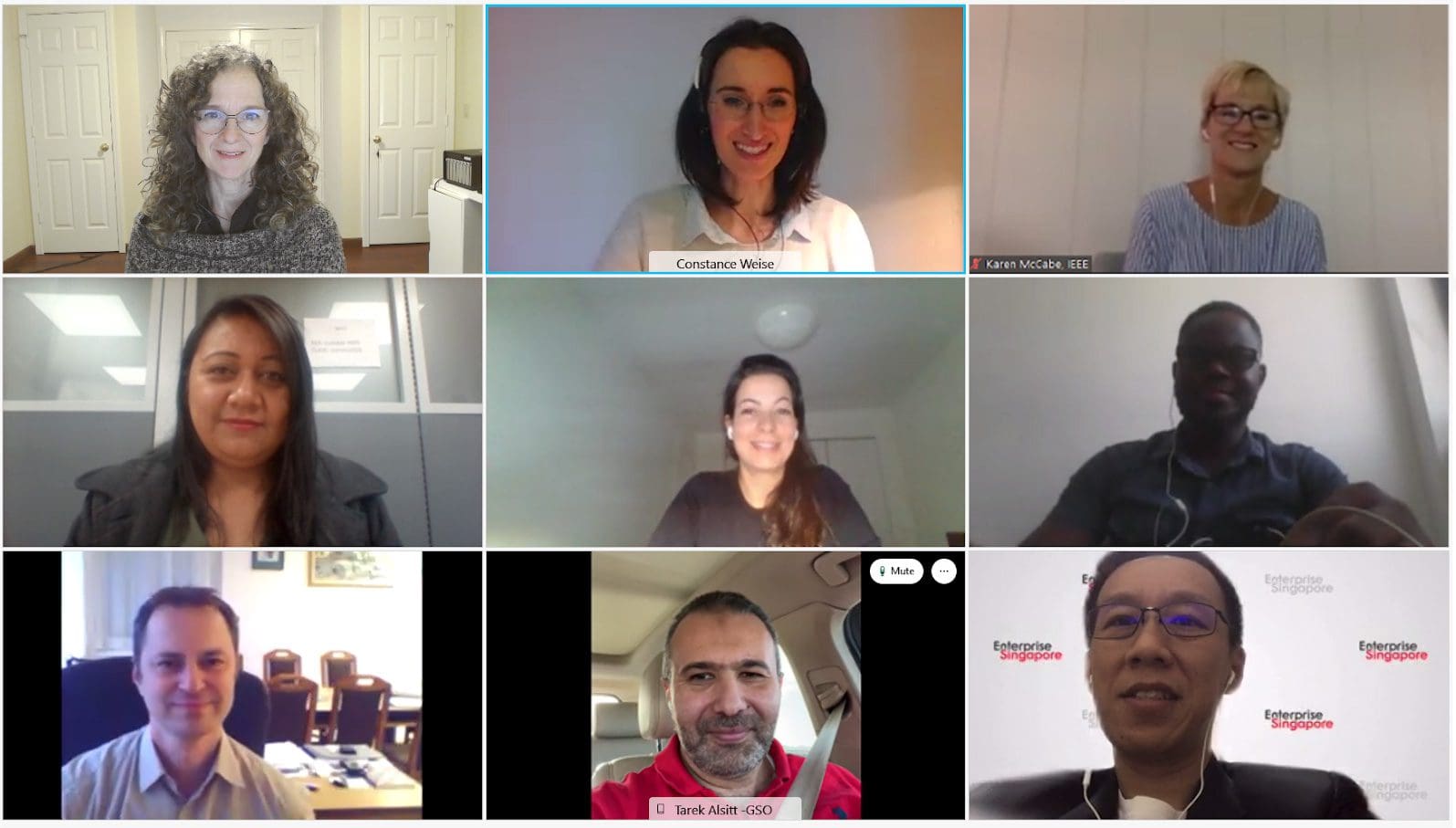
IEEE highly values learning with and learning from national and regional standards professionals from around the world. Our IEEE SA Standards Fellowship program forms a part of IEEE’s outreach on that front. This program is open to standards professionals interested in observing and learning about the IEEE standards development process and about the latest standardization developments in various technical areas. To date, the program has welcomed over 70 professionals from over 30 countries.
The 2021 IEEE SA Standards Fellowship Program participants included six standards professionals from around the world:
- Tarek Al-Sitt, GCC Standardization Organization (GSO), Saudi Arabia
- Alison Aquilina, Standards Council of Canada (SCC)
- Jennyffer Cisneros, Ecuadorian Service for Standardization (INEN)
- Yixiong Kok, Singapore Standards Council, Enterprise Singapore (SSC)
- Dominik Krantz, Hungarian Standards Institution (MSZT)
- Bright Tango, Ghana Standards Authority (GSA)
IEEE SA Standards Fellowship Program participants attend the IEEE Standards Association Standards Board (SASB) meetings, receive tutorials about IEEE SA and relevant topics of interest, meet some of IEEE’s technical experts, exchange standardization information and experiences with each other, and generally get involved in IEEE standards development and related work.
Normally held in person during the December IEEE Standards Association Standards Board (SASB) Meetings, the 2021 program was held virtually. While participants agreed that they would have preferred meeting face to face, the program still succeeded in bringing standards professionals together to exchange thoughts and learn about standardization at IEEE.
Over the course of six days, the group participated in special presentations about the standards development process at IEEE and the IEEE standards adoption process, as well as various interactive presentations tailored to their expressed standardization interests, such as AI Systems, Mobility and Energy. Participants each had the opportunity to make a presentation to the IEEE SASB during the meeting series, introducing themselves and their standards organization. The highlight each year is a special roundtable discussion among IEEE SA Standards Fellowship program participants where they exchange thoughts and experiences with one another.
“The 2021 IEEE SA Standards Fellowship program is a unique program that responds to individual needs of participants and allows for learning through open exchange of information from different regions of the world.”
– Eve Gadzikwa, Standards Association of Zimbabwe (SAZ), returning IEEE SA Standards Fellowship Program participant
One of the main aims of the program is to help standards professionals from national and regional standards bodies to better understand the IEEE standardization process. Through the program, they are able to observe, firsthand, the SASB Committees in operation, along with the SASB itself, as observers in the official meetings. IEEE SA Standards Fellowship program participants are also offered the opportunity to observe a variety of IEEE standards working groups who are developing standards throughout the year. In addition, during the program there is a special session that breaks down the whole IEEE standards development process, so the group can see how a standard is created, from start to finish.
After the experience, participants remarked that they were interested in exploring how they can incorporate some aspects of the structure in their own standardization systems, noting that they found the IEEE system of standardization efficient, productive and flexible. Participants also learned more about the process through which a national or regional standards body can adopt IEEE standards, and the benefits that come along with adopting standards developed through IEEE’s global, bottom up process.
Because the program brings together standardization professionals from many countries around the world, it presents a unique opportunity for connection and exchange of information among participants. One of the best opportunities for this is through the program’s Roundtable session. This year’s Roundtable session, entitled “SDOs & Standards Development Processes,” was moderated by former IEEE SA Standards Fellowship program participant, Eve Gadzikwa, Director General of the Standards Association of Zimbabwe, who presented a series of questions for discussion. To start off, Gadzikwa observed that the standards development ecosystem can be complex with many standards bodies and industry actors, among others involved and asked the participants what challenges they face in navigating the standards development process and ecosystem under the “new normal”?
In response to this, many participants recognized challenges in maintaining the interest and commitment of stakeholders in the standardization process, given the new need to meet virtually and the need to refine partnerships with national and regional governments. Online meetings have meant that potentially more could join, but brought to the forefront challenges with connectivity and scheduling, as well as reduced opportunities for networking which normally takes place during in-person meetings.
The group discussed the need to bring a more diverse group of stakeholders into the process – younger professionals, women, people with disabilities and others, into the standardization ecosystem and voiced hope that the shift to using new communication technologies for virtual meetings will enable this. To this point, participants expressed interest in IEEE’s Industry Connections program, which had been a topic of discussion earlier in the week. The program facilitates broad collaboration around areas where there is not yet a standard, to bring together stakeholders to have discussions about research needed, agreements and strategic ways forward toward standardization.
On the positive side, Dominik Krantz of the Hungarian Standards Institution (MSZT) pointed out that “The COVID situation has accelerated the process to not only provide new digital platforms for working, but also for making new types of standards that are better suited for the digital age. Standards that are readable and usable by machines, standards that are in more modern formats.”
When asked what should be the top priorities for National Standards Bodies today, in light of local and global challenges and the emergence of new technologies, participants made several suggestions:
- Engage research institutions and professional technical institutions in standards development.
- Take into account that standards play a key role in advancing the United Nations Sustainable Development Goals (SDGs).
- Consider the use of standards in environmental, social, and governance (ESG).
- Advance the development and use of gender-responsive standards.
- Develop inclusive platforms that allow access to information and active participation of all stakeholders, taking into account the issues of people with disabilities, among others.
- Create processes that allow standards to be issued more effectively during large scale emergencies.
- Align NSB priorities and standards with national government priorities in order to ensure they are helping the nation toward its developmental and societal goals.
- Engage more with all stakeholders as well as identify those who will be implementing the standards after publication.
The program wrapped up with the last SASB Meeting along with a farewell meeting for the IEEE SA Standards Fellowship program participants, who were in agreement that the sessions would have a positive impact on their work.
“Participating in this year’s IEEE SA Standards Fellowship Program was nothing short of an eye-opening experience. I appreciate how IEEE decentralized their standards development process, which I believe allows for efficient and reliable administration. The organization of the program right from the use of online platform, coordination of communication channels presentations and other related activities has been spectacular despite COVID-19 challenges; For me, ‘Technology is indeed best when it brings people together.'”
– Bright Tango, Ghana Standards Authority (GSA)
For further information about the IEEE SA Standards Fellowship Program, please see the IEEE SA Standards Fellowship webpage and the Fellowship Program FAQ. If you are interested in being nominated to attend the next IEEE SA Standards Fellowship Program, please feel free to contact us via the contact form on the IEEE SA Standards Fellowship webpage.
Author: Kristin Little








